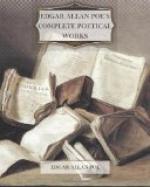“While at the academy in Richmond,
he one day accompanied a schoolmate
to his home, where he saw, for the first
time, Mrs. Helen Stannard,
the mother of his young friend. This
lady, on entering the room, took
his hands and spoke some gentle and gracious
words of welcome, which
so penetrated the sensitive heart of the
orphan boy as to deprive him
of the power of speech, and for a time
almost of consciousness itself.
He returned home in a dream, with but
one thought, one hope in life
—to hear again the sweet and gracious
words that had made the
desolate world so beautiful to him, and
filled his lonely heart with
the oppression of a new joy. This
lady afterwards became the confidant
of all his boyish sorrows, and hers was
the one redeeming influence
that saved and guided him in the earlier
days of his turbulent and
passionate youth.”
When Edgar was unhappy at home, which, says his aunt, Mrs. Clemm, “was very often the case, he went to Mrs. Stannard for sympathy, for consolation, and for advice.” Unfortunately, the sad fortune which so frequently thwarted his hopes ended this friendship. The lady was overwhelmed by a terrible calamity, and at the period when her guiding voice was most requisite, she fell a prey to mental alienation. She died, and was entombed in a neighboring cemetery, but her poor boyish admirer could not endure to think of her lying lonely and forsaken in her vaulted home, so he would leave the house at night and visit her tomb. When the nights were drear, “when the autumnal rains fell, and the winds wailed mournfully over the graves, he lingered longest, and came away most regretfully.”
The memory of this lady, of this “one idolatrous and purely ideal love” of his boyhood, was cherished to the last. The name of Helen frequently recurs in his youthful verses, “The Paean,” now first included in his poetical works, refers to her; and to her he inscribed the classic and exquisitely beautiful stanzas beginning “Helen, thy beauty is to me.”
Another important item to be noted in this epoch of his life is that he was already a poet. Among his schoolfellows he appears to have acquired some little reputation as a writer of satirical verses; but of his poetry, of that which, as he declared, had been with him “not a purpose, but a passion,” he probably preserved the secret, especially as we know that at his adoptive home poesy was a forbidden thing. As early as 1821 he appears to have essayed various pieces, and some of these were ultimately included in his first volume. With Poe poetry was a personal matter—a channel through which the turbulent passions of his heart found an outlet. With feelings such as were his, it came to pass, as a matter of course, that the youthful poet fell in love. His first affair of the heart is, doubtless, reminiscently portrayed in what he says of his boyish ideal, Byron. This passion, he




